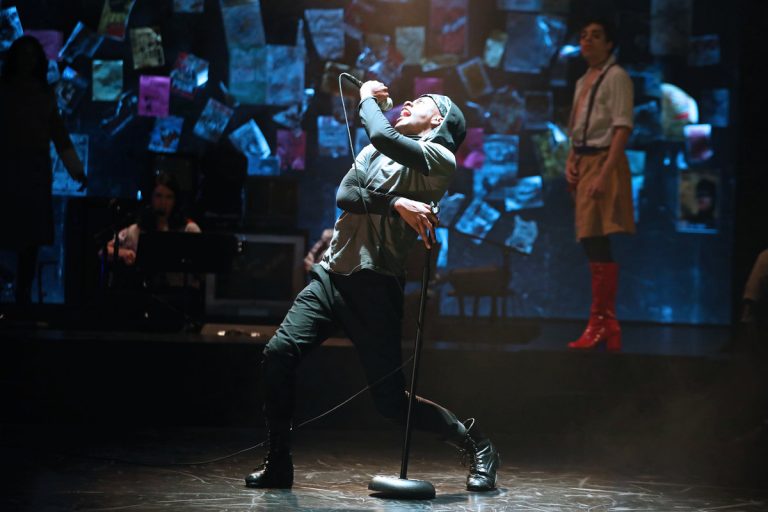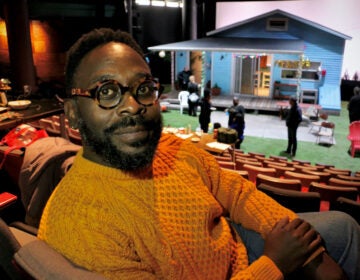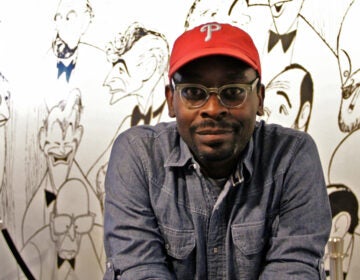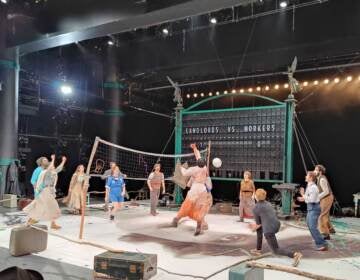‘Passing Strange,’ and grandly
The Wilma Theater production takes a musical to a new level.
Listen 3:00
Jamar Williams (center) and Anthony Martinez-Briggs in the Wilma Theater production of "Passing Strange." (Photo courtesy of Bill Hebert)
‘Passing Strange,’ Wilma Theater Co.
Broad Street between Locust and Spruce streets
Runs through Feb. 18
215-546-7824
wilmatheater.org
—
Bold, boisterous, and bellicose, the Wilma Theater production of the musical “Passing Strange” seems much more real than it did on Broadway 10 years ago. And that’s important: What’s real or not is at the core of the engrossing musical. It’s what a black kid from Los Angeles struggles to find when he bolts from his home and ends up in a fit of self-exploration in Amsterdam and Berlin, on the way to discovering what being an adult means.
The Broadway production starred the one-named Stew, who created and scored it with his equally talented writing partner, Heidi Rodewald. Stew won a Tony Award for writing the show’s clever and intense book, but to the disappointment of many admirers — count me as one — “Passing Strange” withered on Broadway for reasons I can’t understand. It was a solid piece of storytelling.
On opening night Wednesday at the Wilma, and in the staging of the estimable international director Tea Alagić, “Passing Strange” became something else: a grand yet intimate piece of musical theater. It makes my memory of the original seem more like a very fine concert version. At the Wilma, there’s not an ounce of fat in its two acts, and each scene seems to take on a whole new way of delivering Stew and Rodewald’s work: an unexpected monologue delivered entreatingly one minute here, a kinetic demonstration of the ensemble’s strength another. Although no one at the Wilma will say it officially or not, the buzz in New York is that this production — assembled in association with theater and film producers Evamere Entertainment — may become the show’s Broadway revival.
Stew and Rodewald worked with the Wilma two years ago when its artistic director, Blanka Zizka, presented them in a concert that was part of the Philly Fringe Festival. Its five performances sold out before it opened, so the Wilma added a sixth — a rare extension in the tightly scheduled Fringe. It feels right that the theater is going forward with “Passing Strange,” an in-your-face piece that’s, by turns, sweet and rebellious like its main character, and it has an unexpected feel that suits the Wilma’s artistic sensibility.
It’s the story of a boy called only “Youth,” guided by his older self, “Narrator.” We can assume that each is the character of Stew himself, whose younger life mirrors the tale. Youth — a tour-de-force performance from Jamar Williams, an actor and singer who uses his eyes to reveal everything his character thinks and his body to show us he’s bursting out of something — is an unhappy kid. According to Narrator (the excellent, expressive Kris Coleman), Youth feels trapped in a middle-class life in palm-treed L.A. and sees himself as doomed. Worse, his mom (Kimberly S. Fairbanks in a genuine portrayal) is making him go to church. “Jesus will make it back here before I do,” he tells her.
But wait! There are those cute girls in the church choir, plus a possibly cool guy and the reverend’s weed-supplying son (Taysha Marie Canales, Savannah L. Jackson, Anthony Martinez-Briggs, and Linday Smiling, all outstanding as they morph into new roles in new settings). Youth’s search for what’s real — spurred by drugs, politics and social change — begins here, particularly when it becomes the first scenario Youth rejects.
As the show moves to Amsterdam and Berlin, it becomes more than a rock-imbued coming-of-age tale. In his search to find something that may not exist — the definition of being meaningfully real — Youth confronts defining himself. What does it mean to pass yourself off as a ghetto kid because it suits your friendships and your performance art? What’s the basis for belonging to a person or a concept? Can you sever yourself from your roots? As you journey farther from them, how are they a part of you?
Amanda Morton leads the precise four-member band that backs this mostly musical exploration — sometimes the lyrics are overwhelmed a little in the amplification, but you never lose their context. The Broadway designer Scott Pask keeps things simple in a playing space that’s versatile, and Thom Weaver’s lighting is especially beautiful toward the end. The show is choreographed by Constantine Baecher in movements that become part of the narrative, enriching it. Several actors in “Passing Strange” are part of the Wilma’s recently formed HotHouse, a troupe devoted to intense physical training and to new ideas about interpretation. This production brims with them.
WHYY is your source for fact-based, in-depth journalism and information. As a nonprofit organization, we rely on financial support from readers like you. Please give today.




